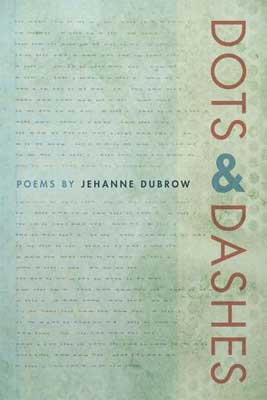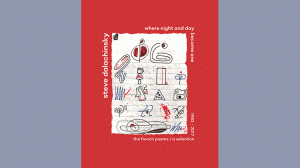Dots & Dashes by Jehanne Dubrow / Southern Illinois University Press (The Crab Orchard Series in Poetry) / 978-0-8093-3609-8 / 2017
 With chocolates shaped like fighter jets, margarita mix in washing machines, and full dress blues, Dots & Dashes by Jehanne Dubrow uses innovation in language and detail to illustrate and explain the life of a military spouse. Dubrow utilizes both traditional and invented poetic form alongside precise language to embody an honest account of being a military spouse and reveal a community behind her words.
With chocolates shaped like fighter jets, margarita mix in washing machines, and full dress blues, Dots & Dashes by Jehanne Dubrow uses innovation in language and detail to illustrate and explain the life of a military spouse. Dubrow utilizes both traditional and invented poetic form alongside precise language to embody an honest account of being a military spouse and reveal a community behind her words.
Dubrow’s consistent use of concrete and sensory details connects poetic form to the very physical experience of being a military spouse. Dubrow’s “Caution: Hole in Ship” is one example of her adept and confident use of form to further express her purpose. This poem’s layout resembles contrapposto by how it spaces out the lines into two columns. The use of white space and alternating line placement illustrates a serious narrative about the speaker’s husband on a ship. The lines themselves are placed over each other in an organized, definite pattern. The form could be used to represent a rigid, back-and-forth conversation or the rhythmic rocking of a boat on the ocean (or perhaps both). The speaker references “those nights of high alert, / when the sea / was streaked with foam,” highlighting a specific physical experience of her husband on the job (17).
“The Long Deployment” is another example of Dubrow’s expert use of poetic technique, as, instead of white space and line breaks, Dubrow highlights sound and smell in order to capture the longing felt during a spouse’s deployment. This poem uses form of a sonnet to create a rhythmic piece with precise diction. She identifies a specific, sharp scent in her longing, stating, “For weeks, I breathe his body in the sheet— / crushed pepper— although perhaps discreet / difficult for someone else to place” (59). She paints a vivid picture with sensory details that capture this moment. “There’s bitter incense paired with something sweet” repeats throughout the entire poem, acting as a refrain that balances and steadies the piece with a consistent rhyme that highlights clever and adept representation of sound (59). Her key attention to detail brings these pieces clarity and allows the reader to vividly imagine a military spouse longing for her husband and seeking pieces of him within the sheets of their bed.
“My Husband Calls Me Shipmate” is an excellent example of Dubrow’s careful use of line breaks, precise, consistent language, and specific sound and rhythm that all work to embody a severe and honest military relationship experience. Dubrow uses short, broken lines that function as staccatos, rupturing through the reader’s self-imposed rhythm to control their pacing and perception of sound, as in the lines, “My Husband Calls Me Shipmate / to indicate / the rank / and file of / my mistake” (34). She captures a precision of language and rhyme in her lines, particularly in, “Each time / the same / routine of click / and flick” (34). The lines continue to push forward, an effortless rhythm and symphony of sound emerging. She is honest and candid about the stringent development of the nature of a military relationship and how the speaker often feels like another one of her husband’s shipmates. Representing a tough, troubling aspect of this relationship through the use of clever sound and rhythm helps to show that no aspect of this life is black and white, and this poem again preserves a moment in a military relationship.
Dubrow’s use of inventive forms to embody meaning, specific language to convey experience, and honesty to capture her meaning throughout each poem reveals a collective voice behind her words, one that is often not heard. In “Five Poetry Readings,” the speaker speaks of the military spouse they notice in the crowd, “This isn’t the first time / I’ve found myself / speaking to the only spouse in a crowd / of officers, as if we’re always pulled / to what’s familiar” (41). Here, she highlights the kinship found through familiar experiences. There is a sense of community here in this poem and throughout the book. In “What We Talk About When We Talk About Deployment,” the speaker and other women, such as “Jane” and “Mary,” discuss their thoughts on deployment, the speaker calling it “misfortune—you only care when it’s your own” (19).
This honesty cuts through the narrative, reminding readers each experience is different and entirely personal. The speakers continues, emphasizing the independent story each woman has: “I dream the four of us are talking. I can see the separate narratives our mouths have formed,” yet she calls back to the sense of community between these women, “how when [they] speak of it, December almost seems to disappear” (19). Dubrow uses consistent concrete and sensory details in combination with form to reveal the wistful nature and the difficult longing of being a military spouse. Her special attention to detail, such as specific places, sounds, and smells, as well as her consideration for other characters, all embody the experience of longing and candidly represent the experiences of a military spouse in order to allow people to gain understanding about an experience they may have never had.
Ultimately, Dubrow seeks to represent the brutal and unrelenting life of a military spouse, stating in “Persuasion,” “We persuade ourselves to love or not, persuade / ourselves of the garden’s beauty / and the walk alone through boxwood lanes . . .” (66). Dubrow’s words remind us there is a community of military spouses behind her words who can see themselves and their experiences represented inside of this book and know they aren’t alone.




Leave a Reply